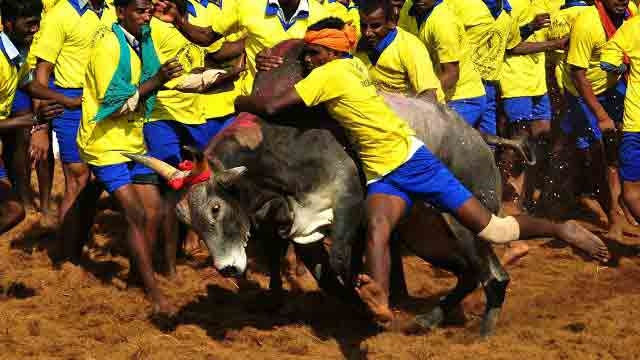#dnaEdit: With jallikattu, Centre resorted to same votebank politics it accused UPA govt of
#dnaEdit: With jallikattu, Centre resorted to same votebank politics it accused UPA govt of
(AFP)
Tame politics.

The exemption made by the environment and forests ministry (MoEF) for jallikattu in Tamil Nadu and bullock cart races in other states was clearly a political decision made with the upcoming TN assembly elections in mind. It was a careless decision too, considering that the Supreme Court had last year banned jallikattu. By staying the MoEF notification on Tuesday, the Supreme Court has, however, reaffirmed the primacy of judicial orders. The MoEF notification was also an instance where the Centre abdicated its responsibility to uphold its own legislation — the Prevention of Cruelty to Animals (PCA) Act. In 2011, the previous UPA government had exercised its powers under the PCA Act to notify that bulls were not to be used, exhibited or trained as performing animals. An appeal against this order led to a landmark Supreme Court ruling that jallikattu and bullock cart races violated various sections of the PCA Act. Considering that the scope of the 2014 Supreme Court judgment went beyond the 2011 order, and also examined the evidence submitted by the Animal Welfare Board of India (AWBI) on how bulls are subjected to torture and cruelty during jallikattu, the MoEF should have been more circumspect. A reading of the 2014 Supreme Court judgment indicates that the court had banned jallikattu, and no executive order could have revived it unless the government chose a legislative path.
The jallikattu ban has been assailed in Tamil Nadu, especially by influential caste groups like Thevars, who claim the sanction of culture and tradition in the continuance of this sport. However, the 2014 judgment noted that welfare and well-being of the bull was a part of ancient Tamil tradition, and ran counter to the credo of jallikattu contests where bulls were being subjected to extreme pain and suffering. In a damning affidavit to the Supreme Court, the AWBI had testified that bulls were beaten, kicked, chilly- powder rubbed into their eyes, their humps and horns were seized and twisted, and that the tails of the animals were routinely pulled, twisted and turned, leading to painful injuries and often to broken tails. Considering this modern context, the judgment noted that the PCA Act, a welfare legislation, would overshadow or override the “so-called tradition and culture”. Despite such observations, the MoEF sanctioned jallikattu by making a half-hearted attempt to curb brutality. It required that jallikattu contests cannot be held without prior permission from the district authorities and that the bull must be tamed within 15 metres of leaving the enclosure. The bulls were to be tested by government veterinarians to ensure that they are in “good physical condition”.
Considering the physical battering that the bulls are subjected to when the jallikattu begins, the requirement placed upon vets to certify their physical condition before the event could have been dismissed as a cruel joke, if it was not so callous. Even the 15-metre-limit is scarcely unimplementable. To rub it in, the ministry had also asked district authorities to ensure that the “rights conferred upon the animals” under the PCA Act by the 2014 Supreme Court judgment “are fully protected” during the jallikattu. Considering that the SC unequivocally held that bulls cannot be used as performing animals in jallikattu in its judgment, the notification qualifies for contempt of court. Besides cruelty to animals, the Supreme Court judgment cited a number of doctrines like the right to life, doctrine of necessity, compassion, humanism and repugnancy to rule that jallikattu was a non-essential activity, in which the welfare of the “bulls was ignored solely for human pleasure”. By staying the MoEF notification, which reversed a progressive stance taken by the Centre in 2011 and the judiciary in 2014, the judiciary has once again bolstered its reformist credentials. The political parties that demanded the restoration of jallikattu with an eye on voters of influential intermediate castes in Tamil Nadu, and the central government, have cut a sorry figure.